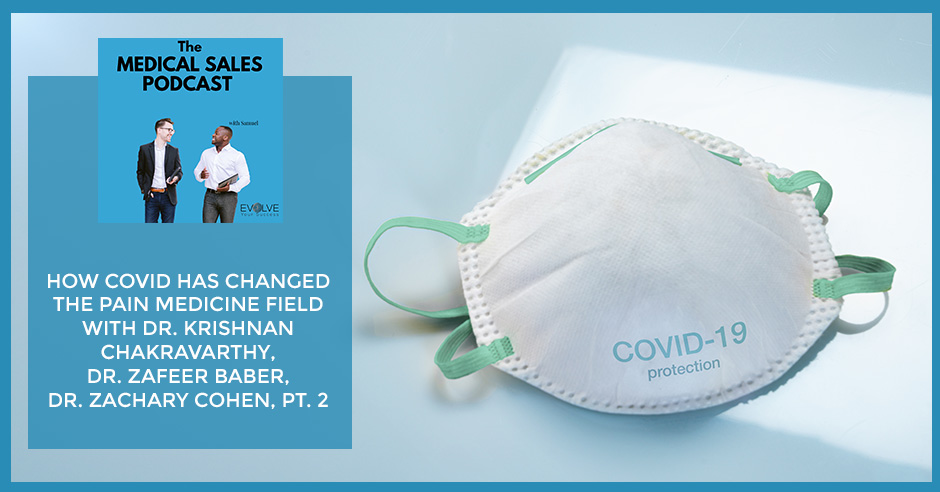
The magnitude of COVID-19’s impact on medicine is such that it has put to the test the very standards of care that professionals in the field use as guide in their practice. Returning to the show with Samuel Gbadebo, Dr. Krishnan Chakravarthy, Dr. Zafeer Baber and Dr. Zachary Cohen discuss how the interventional pain medicine community is striving towards a new consensus on how care should be delivered in the context of a global pandemic. The biggest hurdle before reaching such a consensus is the fact that this pandemic is new to everyone in the field, which opens the floodgates to widely-varying opinions on what COVID really is and what precautionary measures are necessary during procedures. This underscores the need to lay down certain facts for the whole field to move forward. Listen and learn about how thought leaders in the field are engaging in these challenging conversations to bring about the future of interventional pain medicine and what part medical sales reps have to play in all of these.
—
Watch the episode here
Listen to the podcast here
How COVID Has Changed The Pain Medicine Field With Dr. Krishnan Chakravarthy, Dr. Zafeer Baber, Dr. Zachary Cohen, Pt. 2
I’m not going to spend too much time talking about what we have now. If you read the previous episode, you would have heard from three great providers, pain interventionalists, talking about all sorts of things from the way they run their practices, deal with manufacturers, and how COVID is impacting everything. This is the continuation of that discussion. Thank you and I hope you enjoy the show.
—
You guys are pain interventionalists and you just focus on the pain. That is the field and it shifted now to COVID. Dr. Baber, you said that the issues around pain are still very much there. It’s not like that’s died down while COVID has increased. Has it become relatively hectic to manage and everyone is trying to spur the moment to figure things out along with manufacturers, or has there been some process you guys have been able to implement that’s allowed you to still address what’s going on with the pain in light of what’s going on with COVID?
This is a difficult question that we all have had to address during the height of COVID. What’s more dangerous? Having a patient come into a procedure room and get a procedure, or having that patient’s pain not be addressed and then having them go to the emergency room because they’re in such bad pain where there could be in a room full of other people with COVID? It can be a catch-22. We have to look at each patient individually and ask ourselves, “What is the best thing for the patient or what is the least dangerous thing for the patient?” If you tell a patient you can’t get a procedure and the patient tells you back, “My pain is so bad, I have to go to the emergency room,” nobody is doing anybody any favors. We’re not decreasing the risk for that patient at all. We have to take multiple things into account when we look at each individual patient.
I’ll be honest with you, in the beginning, it was a scramble because on day X, everything was normal. On day Y, there was a shutdown. There were hundreds of patients, sometimes thousands of patients in a queue for procedures. We had to communicate with each and every one of our patients to figure out how we’re going to optimize their pain when they couldn’t get their procedures. As a physician, I relied on not only my personal communication with the patient but my reps, nursing staff, medical assistants and secretaries to all come together and figure out a way to optimize the patient’s care and communicate with the patient effectively.
This is a quick question and part of it goes back to my earlier point, how do you get people to essentially follow a set of rules if they have such differing opinions about what COVID is? This is the challenge. Should every practice incorporate testing as part of their care delivery? Versus, does it make sense for some practices to do that? If your practice is in a rural town where the concepts of certain things of including five-minute rapid tests versus sending serology and XYZ in a large health system where we screen everybody that comes in, this is great because I work at a big health system that’s being as rigorous as possible in terms of doing testing and screening patients appropriately. Someone was alluding to this. We can’t get consensus among people about what is reality versus not. If there isn’t real consensus around that, then how do you tell practitioners of all different areas to adopt a certain way of care delivery? I can tell you, we rigorously use testing. We screen and test everybody. You need a COVID test 72 hours before the actual procedure. I can say that because I have a big health system back in my practice.
It’s nice that everybody practices in a different environment. That may not be realistic for everybody but if there is a certain acceptance of facts, then one can start to say, “How do we divert those resources to make it possible for everyone to do that?” The fears points are completely accurate. It goes back to we need more folks educating the broad masses on what’s factual, then people can try to take some of the guidelines and policy.
We’ve done this at the society level where we put out a bunch of different guidelines. We talked about fear. I know you wrote a paper with Steve if I’m not mistaken. The point is people should be reading that and try to implement some of that. A lot of great folks have tried to come up with some solutions across society levels to educate the pain docs on how to care to deliver. The starting point is accepting the base set of facts. This is something we need to address. You adapt that after the fact on what’s relevant.
[bctt tweet=”The patient’s safety significantly outweighs any inconvenience. ” via=”no”]
Right after COVID hit, as pain physicians, we started asking ourselves, “How do we deal with this? When do we know when to do a procedure? When do we know not to do a procedure? How do we treat our patients?” As physicians, we frequently ask ourselves, “What is the standard of care? What is the consensus amongst our colleagues?” The standard of care and consensus is built on what different societies like pain societies adopt as what normal policy is. A lot of times, these pain societies get information to develop a consensus based on what different leaders in the field have to say. These societies get from leaders in the field, they work together to develop a consensus, and then that consensus is considered the standard of care.
Once COVID hit, there was no consensus because this is new to all of us. Me and some other physicians got together and developed a paper. We wrote a paper to say how we should deal with COVID. It involves me and some of my colleagues at Hopkins, another colleague who is at Stanford now, and some of my military colleagues. We got together and worked hard to develop this consensus paper to give guidelines to pain positions across the country to how to deal with COVID-19.
We’ve done some other stuff through ASPN, American Society of Pain and Neuroscience, where we put out some guidelines and we’ve got this manuscript looking at strategic testing. I want to say something that is important. Let’s say testing is at one end of it, simple things like wearing a mask for all of the employees in your practice, I talk about simple social distancing measures, should you have a basic screening tool for any patient walking in? Have you had a cough? What are the symptoms of COVID? These are very practical things you can apply to. That’s what I get back to is these are things that you can apply in a very rigorous, systematic way. Not every center can test, and that might be a challenge based on the resources. It comes back to pushing good factual content out there of the benefits of some of these things. I’m not sure a lot of people still feel strongly about that. It’s where we are now. You talk about the impact of social media, and that is a big part of it, how you screen what’s factual versus not.
I have another question. It deals with what we’re talking about but I want to get your insights on it. How many of you work a lot in surgery centers?
I do.
How about you, Dr. Baber, Dr. Krishnan, surgery centers?

I am in hospital-based programs. It’s not necessarily a strictly outpatient surgery center like Dr. Cohen has.
I wanted to ask you, Dr. Cohen, in working in surgery centers, what’s been easier or more difficult to manage with everything you’re trying to do regarding COVID, addressing your patients and dealing with manufacturers? Does the surgery center environment make that a simpler thing to do or is it the same issues? Tell us a little bit about that.
I don’t think it made it a simpler thing to do but it made it a safer thing to do, which is necessary. In Southern California, we’re lucky we have great weather as some of you guys know. We can eat lunch outside in December, 6 feet apart, socially distance that way. The surgery centers that I work at and I’m affiliated with have put in rigorous testing for staff safety, patient safety, rep safety, where the tests have been more inconvenienced. The safety for the patient significantly outweighs any inconvenience to prevent the spread of this virus. That’s been a good thing. It’s worth waiting a few extra days to make sure there’s a COVID test and all the necessary stuff to put in.
Zafeer alluded to this earlier, but a lot of industry feels that we need to talk about the delivery of spinal cord stimulation. People are doing a ton of trials and now there’s a huge buildup of patients that are trying to get into ASCs for their pain clinicians to do the permanent implant. A lot of industries are like, “How do we solve this issue?” Everybody is doing a ton of trials in their office but we can’t get them into these ASCs to do the latter part of the care delivery. Hopefully, that backlog gets resolved in some ways, but there needs to be a good, consistent, either you incorporate testing or suggested social distancing, etc. It may get resolved but that’s something that industry needs to adapt to. I don’t see this suddenly getting resolved in the next month or two. Come January, February 2021, this is going to be an ongoing issue. We don’t know where the impact of vaccination is going to play into, but we’re a ways away from that. That’s a great question and a challenging one. Everyone is trying to answer this. It’s like, “How do we get these patients into the ASCs to get the perms done post-trial?
As much as the procedures, a lot of what we do is elective. There are significant co-morbidities with patients. Our patient population has such a high concurrent rate of depression. It’s compounded with social isolation. I’ve looked at studies in chronic pain patients with depression, they’re a higher risk for suicide and alcohol abuse. When we do talk about these procedures being elective, they are elective but they can also be life-changing to people and put people on a path to opioid reduction and life improvement. I’m sure we’ve all shared patient experiences where patients say, “We gave them a new outlook on life or a second chance to live a life off these medications and be more functional and enjoy life again.” We do sit here and say elective, but from the patient’s perspective, sometimes it’s not that elective.
That’s why we rely on our reps so much because the reps are in constant communication with our patients. When it’s time to switch to the implantation, we know through our reps which patients are more urgent than the other patients. The reps that I talk to love their job. They go into the profession because they want to change lives. They enjoy working with physicians and they like being in the operating room. The reps, when I talk to them, they say, “I love my job because I first meet a patient.” A lot of times, they think their life is over. They have no function in life, their life is overcome by pain. The rep plays a pivotal role in the process of the patient getting a spinal cord stimulator for example. By the end of their experience, the patient’s life is altered. The reps that I’ve talked to, they love that aspect of the job. COVID-19 made it more difficult for that process to be completed. That means that the process is a lot longer than it used to be. This process that used to take weeks or a month, it’s now taking several months and can possibly take several years, which means that instead of relying on a rep for a short period of time, we’re relying on them for this much longer period of time. I suspect that when the implant gets done, it gives the rep that much more satisfaction in their experience because they play such a pivotal role in altering the landscape of the lives of these patients.
Moving forward, as everyone continues to navigate this environment that we’re in, what would you guys say you would love to see from the manufacturing side of things? Some of it might already be happening, you’ve thought of it, you’ve had passing thoughts like, “It’s so nice if this could happen.” All of you, what would you like to see moving forward with manufacturers?
[bctt tweet=”We are going to be more reliant on remote medicine in the future.” via=”no”]
Spinal cord stimulation is an ever-evolving field. Even the spinal cord stimulators that were state-of-the-art when we were training, which wasn’t that long ago, all of us are relatively young. It changed a lot since then. It’s a field that continues to evolve and change. When the spinal cord stimulators are implanted, there are different settings that you can change within the actual spinal cord stimulator itself to optimize the patient’s pain. Sometimes, for that to happen, the patient needs to come into a physical space with the spinal cord stimulator rep, so the rep can adjust the settings. I don’t know if there’s a future where the rep can do that remotely because we’re going to have to be more reliant on remote medicine. If that’s a possibility, that would be great. Who knows what the future brings?
We’re in a very competitive world. Every manufacturing company wants to have a larger market share. They want to be the company as a go-to for things. One of the opportunities that this presents is for these companies to come together and try to address an important issue. At the end, the care model is consistent, whether you’re using Boston Scientific, Abbott, Medtronic or any of the other potential vendors that are out there, the actual impact of how that care is delivered and the relationship with all of the different pieces is pretty consistent.
One of the things I would love to see all these companies come together and say, “This is our approach for where we are in the COVID climate about protecting the patient, physician and employees.” That may require some amount of coordination among all the different groups that can happen at a societal level. This is a great option for manufacturers in this space to come together. I don’t see that happening very often. Set aside what the individual differences are and say, “This is what’s looking like in the winter. This is what’s going to be happening in January 2021. How do we sort that out? How do we get across the board with some consistency?” It’s better for all of our patients too if they can work together on that.
I echo with what Dr. Krishnan said. The thing to your question is what’s the one thing that Pharma industry can do? The thing that we all can do as people is have understanding, respect other people, know that other people have different views, and put the patient’s safety, number one. We’re all coming from a place of the greater good for the patient. We all do this differently. The patient’s safety as our own now because this is a weird situation where we’re talking about physician staff and rep safety as well. All that stuff needs to be more of a team working environment. A lot of that is understanding that people have different views. You don’t have to agree with them but you’ve got to respect them. It’s out of someone’s want for safety in the care of health. That’s the biggest thing that needs to be done.
I hear and I wonder, especially when it comes to manufacturers, as you were saying, standard procedures. What is the rule of thumb that’s shared by everyone across the board? That could be a good step towards everyone, at least working for the greater good together as opposed to competitively and individually.
I personally don’t think there is one step because this isn’t a one-size-fits-all solution. You have three doctors on here that all have very different practices. I don’t know if the university setting can extend their hours. That’s something that we’ve done in private practice to reduce our patient flow to keep people safe or to have less people in the waiting room. Everyone has different resources, but having that general respect that every situation is a little different with the greater good of the patient, staff and everyone’s safety is the most important. That takes precedent.
It brings up a good point though. All the manufacturers understand that their demographic of customers can range from faculty of the university to a small private practice. It goes back to education now is a lot easier. The fierce point is he can get on a webinar and here’s some guy across the world talking about a topic. How you’re dispensing that education and the content of that is hugely critical. If you can get some consensus across the board among the different manufacturers that this is what we think should be done for ASCs and university settings, that would be helpful. At the end of the day, everybody wants the best for our patients. That’s two fronts. What do you deliver? How do you deliver? How do you get them access to that? It’s a great initiative. It should have been done way sooner, but there’s got to be some consensus and unification around that. That’s something everybody can work towards a common goal.

We all want to end this because we love seeing people get better and helping them out.
It’s important for these companies to get together. Frequently, the company over-emphasizes their technology and under-emphasizes their rep. As Dr. Cohen said earlier, when it comes to a specific spinal cord stimulator, the race car driver is more important than the actual race car. I’ve talked about this earlier with you, Samuel, I would much rather pick a company with a good rep than a good spinal cord stimulator because the better rep will make a bigger difference to the patient than the “better technology.” In the future, I would like to see more emphasis on the actual rep than the subtle change in technology because that’s what is going to make the difference in the patient’s life. All things being equal, I would pick the rep over the technology.
I’m going to add one thing, Samuel, we talk about subtle differences and science has come a long way. There is more and more level one evidence studies that are supporting specific indications like MRI compatibility are all of these things that we think about in our patients. I can imagine that in the coming years, the way we think about these devices is going to be different. The advent of miniaturization is going to drive that conversation in a different model. Who knows whether we’re going to be ever doing implants in an operating room?
We look at things so differently now than we did years ago. For the evolution of the field, I hope that we look at things very differently in the coming years. I’m excited for all that stuff personally.
The fierce point is a good one, especially regarding safety and care delivery. The reps are a critical part of the folks that are out in the field. That’s what you dictate in terms of all the expectations of them interfacing with the practice, testing or that everybody should be wearing masks. There’s no time like the present to have that addressed. I feel strongly about that.
This was excellent, gentlemen. I appreciate all the time that you guys gave, and all the knowledge and wisdom that we’re able to share and discuss. Lastly, I’ll start with Dr. Baber, anything you want to share with the audience before we wrap up?
Whether you are a new rep in the field or you’ve been there for years, find one good mentor, one person that can show you the ropes, and form a good relationship with them. I’m looking at the show and I was thinking to myself, if years ago you would have told me that I’d be doing a podcast with Zach Cohen and he’d be holding his baby, looking and talking to me, I’d be like, “That’s crazy.” I’ll be honest, years ago, this is not how I saw Zach Cohen. We were friends skiing in the Rocky Mountains and we weren’t even thinking about this like he’s holding a baby. It shows to me how important relationships are. Me and Dr. Cohen’s relationship has evolved where he talks to me about his baby and his practice. Grow together with the people that you train from and work with, find a good mentor who gives good advice and good direction that can help you with your career.
[bctt tweet=”A better rep makes a bigger difference to the patient than better technology.” via=”no”]
Dr. Baber has amazing advice. I have a great mentor myself that I spend and walk with once a week at night. The only advice I would give is this world is full of amazing people that all have the best interest at heart. We get there from different angles. I hope people can have a lot of understanding and most importantly, respect for other people because this is a very stressful time for everyone and we all want good to prevail. I hope that everyone can have a little bit more patience with other people. You don’t have to agree with someone’s opinion but I do think you have to respect it. In these challenging times, having extra respect and understanding is much more important.
I was going to share the same sentiments. We are in an interesting time in our history. Whatever our individual opinions are, how do we take those opinions and make it so that another person feels that they’re validated? At the end of the day, it’s important to know what are things that have been repeated in history over and over? What are things that have been supported by facts versus being respectful of other opinions? Coming to a consensus, that’s the challenge. Having disagreements but not moving forward doesn’t make sense. We’ve got to make positive steps in saying that I’ve listened to different things and I’ve come together to make a difference in some part of it.
I love these guys. You’re getting the best advice from both of them. It’s telling you to look at all the different ways that people have come together, friends that have thought about their career and their life. I’m with both of them. Opinions and relationships are the single most important impact. Be skeptical as well as think through. Take anything that you hear and learn it. Tease it out for yourself. Validate it and don’t validate, but you’ve got to take that step. Don’t be like, “I’m going to be the guy that’s taking it and stuff,” without thinking rationally through it of whether it makes sense.
That’s key what you said. As crazy as 2020 has been for everyone, the awareness that we all need to have and the active thinking with what we hear and what we understand are coming to our conclusions and not parroting what we’ve heard. More people are realizing how important that is. If you look at it from medicines to politics, it’s showing its face everywhere. The people will say, “I can think through that on my own. I can come to my own and derive a conclusion.” Thanks so much, gentlemen. This was a wonderful time. At some point in the far future or even near future, we’re going to have to have a part two because this was great.
Samuel, thanks for having me. Thanks for making this happen, Zafeer.
Thanks so much for the invite. I’m very honored to be a part of this.

It was a lot of fun.
—
Wasn’t that great to read through? What I loved about that episode is you can tell that we had fun in that discussion. It’s nice to spend time with a group of individuals that know each other and have all shared a very similar life experience. The insight was excellent. Everyone had something to say but they all had a slightly different take on what’s going on. As far as the solutions were concerned and what to do about it, everyone was in agreement. One thing that we all ended it with was the relationships and how important relationships are, especially in this time. From isolation to how do we get around not feeling isolated when everyone has to spend so much time in their own space and how do we maintain and remember that?
We’ve got to have a lot of respect for our fellow people. We’ve got to do what we can to maintain good relationships and create good relationships. It’s incredibly valuable and it can help all of us from providers, manufacturers, sales reps that work within them, and to the patients. It can help all of us be more sustained through this challenging time. They spoke to that. It was excellent to talk about. A couple of things that I want to make sure we keep in mind from this interview. Everyone is trying to figure it out. It’s easy to confuse the public because you have the news, the president, everyone is saying different things, who knows what’s what and who knows what’s real? It’s good to know that providers understand that and they’re dealing with the same thing. They’re fighting to make sure that the facts remain the facts and that science remains science. That what makes sense from their perspective, because they’re providing care for us, is consistent and maintained so that we can all be taken care of with this whole pandemic.
We also touched on what they want to see moving forward when it comes to working with manufacturers. You notice that every one of them highlighted how important the relationship needs to be with the representative. That’s why I say this is so critical for everyone to know whether you’re trying to get in, you’re in or you’re leading the way. You can see that it’s not always about the technology. Of course, providers want amazing technology in their practices, especially if it makes these procedures more effective and these outcomes better, but at the end of the day, you’ve got to have a good relationship with the representative. You can’t get around that. Even Dr. Baber said, as far as he’s concerned, the relationship with the representative is more important than the technology in a lot of cases. That’s great because it empowers someone that is a sales rep, a sales leader or a sales professional who wants to be one and listen to others like, “Your role is a critical role.” You showing up and being the best you can possibly be or you want to be in this industry and realizing that you need to come in and be the best you can be is an important thing to take to heart. It was so nice to hear from the providers that perspective.
Thank you for reading. If you’re someone that wants to get into a role, you’ve been thinking about this, and you’ve been saying, “I want to be a medical sales professional,” then make sure you visit EvolveYourSuccess.com and take the assessment. On the homepage, you can select Attain A Medical Sales Role, you can take the assessment, and it will guide you through showing you what you need to have and giving you the opportunity to get in conversation with us here at Evolve Your Success, and get ahold of some resources that can get you into the position you want to be in.
If you’re a medical sales professional and you want to improve your performance, you want to have that great relationship with your provider. You want to do things that you haven’t been able to do because of the environment that COVID puts you in, or it’s because you know that some skills that you want to better develop to be that much more effective and be that true resource to providers like the ones you know. Then make sure you visit EvolveYourSuccess.com and select Improve Sales Performance. Let’s have a conversation and talk about how our resources can help you be that much more effective. I always try to bring you the best guests so that you can get true insight on what happens in pharmaceutical sales, medical device sales, genetic sales or lab sales. What’s going on not just from the manufacturer’s point of view, but also the provider’s point of view, a representative’s point of view, and even the leader’s point of view. I intend to do that every week, so make sure you read the next episode of the Medical Sales Podcast.
Important Links:
About Krishnan Chakravarthy
 Dr. Krishnan Chakravarthy, MD, Ph.D., is an anesthesiologist who specializes in multi-modal pain management. He completed fellowship training in pain management at Harvard Medical School, Massachusetts General Hospital and residency training in anesthesiology at Johns Hopkins School of Medicine, The Johns Hopkins Hospital. Dr. Chakravarthy earned his medical and doctorate degree from the University at Buffalo School of Medicine and Biomedical Sciences.
Dr. Krishnan Chakravarthy, MD, Ph.D., is an anesthesiologist who specializes in multi-modal pain management. He completed fellowship training in pain management at Harvard Medical School, Massachusetts General Hospital and residency training in anesthesiology at Johns Hopkins School of Medicine, The Johns Hopkins Hospital. Dr. Chakravarthy earned his medical and doctorate degree from the University at Buffalo School of Medicine and Biomedical Sciences.
As an Assistant Professor in the Department of Anesthesiology, and Affiliate Professor in the Department of Nanoengineering, Dr. Chakravarthy instructs medical students, residents and fellows at UC San Diego School of Medicine, in addition to running his own laboratory. His research interests include incorporating new technology into advancing pain care. This includes advancing the field of neuromodulation as well as using nanotechnology to develop new drug delivery and point of care device platforms to manage chronic pain. His research work has been featured in national and international venues and has been published in top journals, including Anesthesiology, Proceedings of the National Academy of Sciences of the United States of America, and Pain.
About Zafeer Baber
 College- BS in Biomedical Engineering at Columbia University
College- BS in Biomedical Engineering at Columbia University
Medical School-Chicago Medical School, Rosalind Franklin University
Residency in Anesthesiology-Columbia University Medical Center
Fellowship in Interventional Pain Medicine-The Johns Hopkins Hospital
Master’s in Journalism (Currently pursuing)-Harvard Extension School
About Zachary Cohen
 Medical School: Rosalind Franklin University of Medicine and Science
Medical School: Rosalind Franklin University of Medicine and Science
Internship: Case Western Reserve University/University Hospitals Case Medical Center
Residency: UPMC University of Pittsburgh Medical Center
Fellowship: University of California San Diego
Love the show? Subscribe, rate, review, and share!
Join the Medical Sales Podcast Community today:



















































































